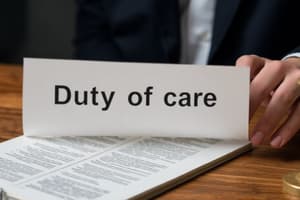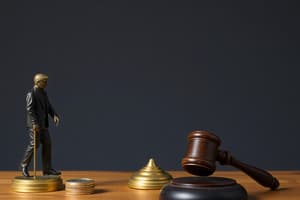Podcast
Questions and Answers
Which of the following statements about a code of ethics is most accurate? A code of ethics:
Which of the following statements about a code of ethics is most accurate? A code of ethics:
- must include principles-based standards of conduct.
- must include rules-based standards of conduct.
- does not need to include standards of conduct. (correct)
Which of the following statements about legal and ethical standards is most accurate?
Which of the following statements about legal and ethical standards is most accurate?
- Legal standards are a subset of ethical standards.
- Ethical standards are a subset of legal standards.
- Ethical and legal standards often intersect, but not always. (correct)
A requirement that investment professionals act in the best interests of their clients is a:
A requirement that investment professionals act in the best interests of their clients is a:
- fair dealing standard.
- fiduciary standard. (correct)
- suitability standard.
A framework for ethical decision making is most appropriately applied to:
A framework for ethical decision making is most appropriately applied to:
A requirement that investment professionals recommend securities that match their clients' requirements and constraints is a:
A requirement that investment professionals recommend securities that match their clients' requirements and constraints is a:
Unethical behavior by individuals in the investment industry is most likely to:
Unethical behavior by individuals in the investment industry is most likely to:
Standards of conduct are most accurately described as:
Standards of conduct are most accurately described as:
Unethical behavior by a financial professional harms:
Unethical behavior by a financial professional harms:
Unethical behavior by financial professionals:
Unethical behavior by financial professionals:
Ethics are most accurately defined as:
Ethics are most accurately defined as:
Ethics least likely refers to:
Ethics least likely refers to:
CFA Institute Standards of Professional Conduct are most accurately described as being based on:
CFA Institute Standards of Professional Conduct are most accurately described as being based on:
Which of the following statements about legal and ethical standards is most accurate?
Which of the following statements about legal and ethical standards is most accurate?
Which of the following best describes elements of a framework for ethical decision making?
Which of the following best describes elements of a framework for ethical decision making?
A code of ethics:
A code of ethics:
Establishing standards of ethical behavior and monitoring professional conduct are best described as ways that professions:
Establishing standards of ethical behavior and monitoring professional conduct are best described as ways that professions:
A profession is most accurately described as an occupational group that requires its members to:
A profession is most accurately described as an occupational group that requires its members to:
Challenges to ethical behavior are most likely to arise from:
Challenges to ethical behavior are most likely to arise from:
An ethical decision-making framework:
An ethical decision-making framework:
Which of the following characteristics distinguishes a profession from an occupation? Members of a profession:
Which of the following characteristics distinguishes a profession from an occupation? Members of a profession:
Flashcards
Code of Ethics Standards
Code of Ethics Standards
A code of ethics may include standards of conduct, but does not require them.
Ethical vs. Legal Standards
Ethical vs. Legal Standards
Ethical and legal standards often intersect but aren't subsets of each other; some legal actions may be unethical, and vice versa.
Fiduciary Standard
Fiduciary Standard
A fiduciary standard requires professionals to act in the best interests of their clients, using their expertise.
Ethical Decision-Making Framework
Ethical Decision-Making Framework
Signup and view all the flashcards
Suitability Standard
Suitability Standard
Signup and view all the flashcards
Impact of Unethical Behavior
Impact of Unethical Behavior
Signup and view all the flashcards
Standards of Conduct
Standards of Conduct
Signup and view all the flashcards
Harm from unethical behavior?
Harm from unethical behavior?
Signup and view all the flashcards
Definition of Ethics
Definition of Ethics
Signup and view all the flashcards
CFA Institute Standards Basis
CFA Institute Standards Basis
Signup and view all the flashcards
Legality vs. Ethicality
Legality vs. Ethicality
Signup and view all the flashcards
Challenges to Ethical Behavior
Challenges to Ethical Behavior
Signup and view all the flashcards
Defining Profession
Defining Profession
Signup and view all the flashcards
Study Notes
Code of Ethics
- A code of ethics may optionally include standards of conduct
Ethical vs Legal Standards
- Ethical and legal standards frequently overlap, but not always.
- Actions that are legal may be unethical, and vice versa.
Fiduciary Standard
- A fiduciary standard requires investment professionals to use their expertise to serve clients' best interests.
Ethical Decision-Making Framework
- An ethical decision-making framework aids decision makers by considering options and their effects on stakeholders.
Suitability Standard
- A suitability standard involves recommending securities that align with a client's needs, return expectations, and risk tolerance.
Unethical behavior
- Unethical conduct in the investment sector can divert capital from its most productive uses, slowing economic growth
- Over time, unethical actions reduce financial service firms' profits by deterring potential clients.
- Distrust in the investment industry causes savers and investors to reduce capital supply and demand higher returns, which raises the cost of capital for businesses.
Standards of Conduct
- Standards of conduct specify minimum levels of expected behavior in various situations
- A code of ethics communicates the values and expectations for professional behavior
- Standards of conduct are not a required component of code of ethics
Harm from unethical behaviour
- Unethical behavior harms clients, employees, and society by decreasing trust in the financial services profession
- It also increases investment risk, raises capital costs, and distorts capital allocation across the economy.
How unethical behavior affects capital
- Unethical behavior escalates risks and capital expenses
- In the long term, unethical conduct diminishes public confidence and reliance on financial experts, which reduces their earnings.
- Unethical actions, can negatively impact how financial capital is allocated.
Ethics
- Ethics refers to the study of moral principles
- Ethics is broader than specific beliefs or written rules
CFA curriculum
- Within the Level I CFA curriculum, an individual's beliefs do not constitute ethics
- Ethics can be defined as accepted good and bad behavior principles, including the study of them.
CFA Institute Standards
- CFA Institute Standards of Professional Conduct are based on the CFA Institute Code of Ethics
Legal vs ethical acts
- Some illegal acts, like civil disobedience, can be considered ethical by some.
- Not all unethical behavior is necessarily illegal.
Framework for ethical decision-making
- An ethical decision-making framework includes identifying facts, stakeholders, ethical principles and conflicts of interest
- Consider alternative actions, situational influences, and the need for additional guidance
- Decide and act and reflect on outcomes.
Features of code of ethics
- A code of ethics can be rules-based or principles-based
- A code of ethics does not ensure total compliance
- A group adhering to a code of ethics can, however, present a positive image to clients.
Profession's trust
- Professions build trust by setting high standards for expertise, knowledge, and skill
- By establishing standards of ethical behavior, monitoring conduct, promoting continuing education, focusing on clients' needs, and providing mentorship.
Profession definition
- A profession needs members with specialized knowledge
- A profession often focuses on ethical behavior and service to the wider community/society
- Professions require members to put clients first or serve the wider community, these aren't what defines a profession however
Challenges to ethical behavior
- Challenges to ethical behavior most often arise from situational influences (external factors)
Ethical decision-making framework
- An ethical decision-making framework is designed to consider alternative actions and any potential unintended consequences.
Profession
- One characteristic that differentiates a profession from an occupation is the agreement to adhere to a code of ethics.
Studying That Suits You
Use AI to generate personalized quizzes and flashcards to suit your learning preferences.




